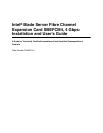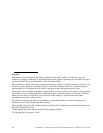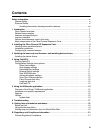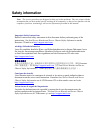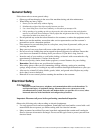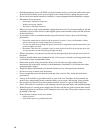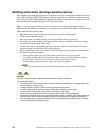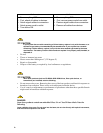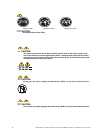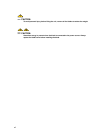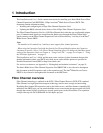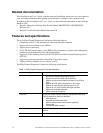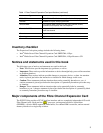vii
• Find the emergency power-off (EPO) switch, disconnect switch, or electrical outlet in the room.
If an electrical accident occurs, you can quickly turn off the switch or unplug the power cord.
• Do not work alone under hazardous conditions, or near equipment that has hazardous voltages.
• Disconnect all power before:
— Performing a mechanical inspection
— Working near power supplies
— Removing or installing main units
• Before you start to work on the machine, unplug the power cord. If you cannot unplug it, ask the
customer to power-off the wall box (that supplies power to the machine) and to lock the wall box
in the off position.
• If you need to work on a machine that has exposed electrical circuits, observe the following
precautions:
— Ensure that another person, familiar with the power-off controls, is near you. Remember: another
person must be there to switch off the power, if necessary.
— Use only one hand when working with powered-on electrical equipment; keep the other hand in your
pocket or behind your back.
— Remember: There must be a complete circuit to cause electrical shock. By observing the above rule,
you may prevent a current from passing through your body.
• When using testers, set controls correctly and use the approved probe leads and accessories for
that tester.
• Stand on suitable rubber mats (obtained locally, if necessary) to insulate you from grounds such
as metal floor strips and machine frames.
• Observe the special safety precautions when you work with very high voltages; these
instructions are in the safety sections of the maintenance information. Use extreme care when
measuring high voltages.
• Regularly inspect and maintain your electrical hand tools for safe operational condition.
• Do not use worn or broken tools and testers.
• Never assume that power has been disconnected from a circuit. First, check that it has been
powered-off.
• Always look carefully for possible hazards in your work area. Examples of these hazards are
moist floors, nongrounded power extension cables, power surges, and missing safety grounds.
• Do not touch live electrical circuits with the reflective surface of a plastic dental inspection
mirror. The surface is conductive; such touching can cause personal injury and machine damage.
• When the power is on and power supply units, blowers and fans are removed from their normal
operating position in a machine, do not attempt to service the units. This practice ensures correct
grounding of the units.
• If an electrical accident occurs, use caution:
— Switch power off
— Send another person to get help/medical aid



